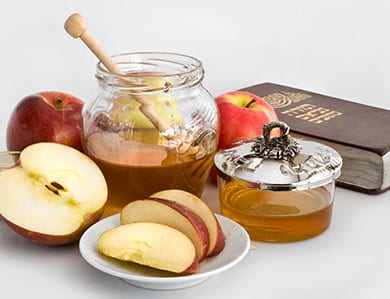 Later this month many Jews will recognize the ten-day period referred to as the “Days of Awe” or “Ten Days of Repentance” starting with Rosh Hashanah, the Jewish New Year, and commencing with total fasting on Yom Kippur, the Day of Atonement. In the Jewish tradition, the High Holy Days are an opportunity to consider what needs to be transformed in our lives and actively realign our priorities. It is also a good time for Christians to join our fellow Jews and reflect on our lives, the parts that we often do not want to confront and look to God for wisdom, conviction and renewal. This ten-day period is a time of reckoning that invites people to take ownership and responsibility for their individual sins and those of our collective community. Rosh Hashanah begins with Genesis 21 and the birth of Isaac, a passage rich with the light and dark of human nature.
Later this month many Jews will recognize the ten-day period referred to as the “Days of Awe” or “Ten Days of Repentance” starting with Rosh Hashanah, the Jewish New Year, and commencing with total fasting on Yom Kippur, the Day of Atonement. In the Jewish tradition, the High Holy Days are an opportunity to consider what needs to be transformed in our lives and actively realign our priorities. It is also a good time for Christians to join our fellow Jews and reflect on our lives, the parts that we often do not want to confront and look to God for wisdom, conviction and renewal. This ten-day period is a time of reckoning that invites people to take ownership and responsibility for their individual sins and those of our collective community. Rosh Hashanah begins with Genesis 21 and the birth of Isaac, a passage rich with the light and dark of human nature.
Rosh Hashanah
Beginning at sundown on September 24, 2014, Rosh Hashanah marks the Jewish New Year. Jews celebrate this holiday with festive meals and prayer services. It is also called the Feast of Trumpets in the Bible because it begins with the blowing of the ram’s horn, the shofar, calling God’s people together to repent from their sins. Rosh Hashanah is also the start of the civil year in Israel. It is the beginning of the ten-day period that focuses on repentance or teshuvah. Teshuvah literally refers to stopping in one’s tracks and turning around in the other direction — a recognition that we have both the capacity to make big mistakes and the capacity to turn from our unloving, unmerciful, unjust, selfish ways and repent. The shofar is designed to be a loud wake-up call, inviting individuals to feel the breach we’ve made in our relationships with ourselves, with others and with the world, so we can turn it around. Rosh Hashanah is a solemn day of soul-searching, forgiveness, repentance and remembering God’s judgment. It is also a joyful day of celebration with thanksgiving for God’s forthcoming goodness and mercy in the New Year. The observance of the Feast of Trumpets is recorded in the Old Testament book of Leviticus 23:23-25 and also in Numbers 29:1-6.
Yom Kippur
The ten days of reflection and repentance culminates on Yom Kippur or the Day of Atonement. “Yom” rhymes with “home” and “Kippur” sounds like “key poor” with emphasis on the “poor.” It is the holiest day in the Jewish calendar. According to Jewish tradition, God opens the Book of Life and studies the words, actions and thoughts of every person whose name he has written there. If a person’s good deeds outweigh or outnumber their sinful acts, his or her name will remain inscribed in the book for another year. As part of their atonement, adult Jews fast for the entire day and abstain from other forms of pleasure. At the end of Yom Kippur, Jews consider themselves absolved from their sins. They begin the new year with a renewed sense of purpose, a clean slate and a commitment to a moral and just life in the year to come.
Sukkot or the Feast of Tabernacles
Sukkot or the Feast of Tabernacles is a week-long festival that commemorates the 40-year journey of the Israelites in the wilderness. The word Sukkot means “booths.” During this week, Jews build and dwell in temporary shelters or booths in joyous remembrance of God’s protection, provision and care when they were wandering through the desert. The shelters are built with three walls and are framed with wood and canvas. The roof covering is created with loosely-placed cut branches and leaves, leaving open space to see the stars and allow rain to enter. Sukkot begins five days after Yom Kippur. Since it is a harvest celebration, typical foods include fruits and vegetables.
Connecting With Jews
On Rosh Hashanah, you can wish your Jewish neighbors happy new year by saying “L’Shana Tova,” which translates to “For a good year” in Hebrew. If you are invited to a home and want to bring a gift, you can bring something sweet, which symbolizes wishes for a sweet new year. It is for this reason that Jews will often dip apples in honey on Rosh Hashanah. Kosher chocolates & candies, baked goods or fruit (especially apples or pomegranates) are also excellent Rosh Hashanah gifts. Since Yom Kippur is a fast day, it is appropriate to wish your Jewish friends and neighbors an “easy fast.”
All of God’s festivals are about remembering something and about looking forward to something. God calls his people to celebrate the festivals. Jesus celebrated these feasts as did the early Christians. God is at work. What are you remembering and what might God be unfolding in your life?
Dr. Terry Morrow Nelson is the President of Morrow and Associates Partnership for Leadership and Transformation and a Certified Christian Conciliator. She also serves as an assistant dean and assistant professor at Nova Southeastern University.

Comments